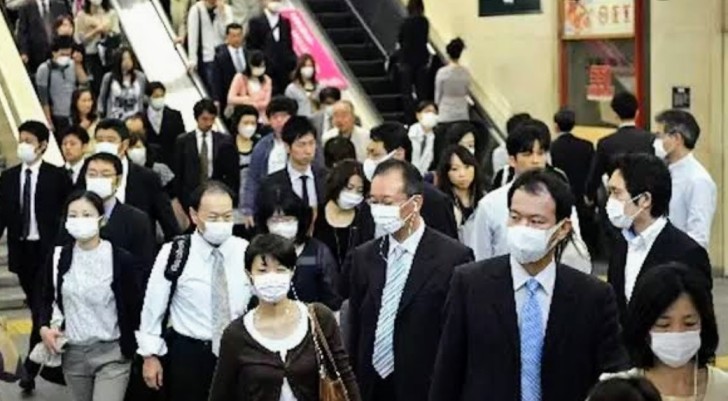Public Obedience and Hygiene: Lessons to be learned from Japan to curb COVID-19 spread
Instead of effecting lockdown, the Japanese government has resorted to public obedience policy because the people in Japan are remarkably self-disciplined, and follow the rules on their own.
By Ramesh Sharma, Founder & MD, Sakura Group of Companies
NEW DELHI/TOKYO: India, like many other countries, is fighting an unprecedented battle with an invisible but potent enemy Novel Coronavirus, also called COVID-19. However, India is destined to win this battle not on the basis of its military might but with the support of its billion-plus people.

Self-restraint measures like observing social distancing and remaining hygienically clean hold the key in the fight against this deadly virus that has brought a score of nations on its knees.
Many nations including the developed ones have applauded and followed Namaste – the greeting style of India as it helps in avoiding human to human contact as the western style of shaking hands could prove to be lethal.
However, social distancing alone would not work in the fight against coronavirus as keeping oneself hygienically clean too is super essential.
It is high time, however, that we take a serious look at the lifestyle of the Japanese citizens who are popular world over for their etiquette. Some more Asian countries like South Korea are known for their clean lifestyle but here I would like to share my experience with Japanese citizens because of my close proximity to them owing to my business in Japan for over two decades.
The outbreak of coronavirus has forced millions across the world to wear facemasks, a practice that has been a very commonly prevalent practice in Japan.
Generally, most of the Japanese people own the habit of wearing a facemask in their day to day life when they move around at public places or while using public transport means which are crowd-ridden.
Women enjoy the fancy of buying colorful masks with Sakura (Cherry Blossom flower) textured on them and children have dedicatedly crafted masks that can fit their faces.
Public or private bathrooms, they always clean before and after their use. They have learned that a person can be infected without showing symptoms, so cleaning public toilets after using and the use of sanitizers and face masks is not only a precautionary measure for self but also for the thought that they can transmit the infection to someone else.
You can find most of the shops or stores and business establishments having placed liquid sanitizers or hand rubs at the entrance of their premises. Sanitization is a “must” in Japan and the Japanese learn about basic hygiene from an early age.
Even though the number of coronavirus positive cases in Japan is ticking up but it is happening at a very slow pace, and the Japanese government has so far refrained from clamping lockdown and stayed away from enacting an ordinance to stash its people into their homes by using force.
The Japanese government has, instead, resorted to public obedience policy because the people in Japan are remarkably self-disciplined, and follow the rules on their own. Obedience flows in their blood.
People here are very receptive, honest and loyal towards their nation
I have experienced that these days Japanese don’t even use their hands to open or close doors, and instead use their shoulders for it. And in their everyday lives, while using public transportation, they don’t have a habit of holding support handles in the trains or buses.
People in Japan don’t have a habit of standing too close to each other or touching each other while in a crowded place. They maintain a small distance from each other in places like a queue or a waiting area/ waiting for any public transport like train or bus
If someone is suffering from fever, the person will self-isolate himself/herself or distance himself socially.
The world-famous Japanese greeting style involving bowing posture ensures foolproof social distancing as when two sides of people bow, they make sure that the distance between them is at least one meter.
When in homes, the Japanese would keep separate footwear for both inside and outside usage. As a matter of practice, they keep their shoes and slippers used outside, in their racks and put on separate slippers while being inside their houses. They would use separate slippers inside their washrooms. They always keep a set of guest slippers ready when they have guests staying with them. They would keep separate slippers at their courtyard/balcony or garden. They practice high hygiene standards as part of their culture.
Most Japanese family’s houses consist of a room, the flooring material of which happens to be a mat made out of igusa (woven soft rugs), and no member of the family enters that room with slippers on.
People in Japan don’t have a habit of leaning over walls or holding a staircase or steel railings in public.
They just don’t litter streets anywhere in Japan. If a Japanese person doesn’t see a dustbin nearby to throw an empty pack of chips or water bottles, he/ she will just keep it with them until they find a dustbin. It will be hard to find a toffee wrapper lying on the road in the streets. They don’t have the habit of spitting in public places and are never ever out of small pocket tissue packets.
Tokyo is a densely populated city and somehow in very unfortunate events the cruise ship named ‘Golden Princess’ arrived from outside of Japan, ferrying COVID-19 infected passengers which made it a bit hard for Japan to contain the spread of the Coronavirus.
Japan has not so far imposed any restrictions on running shops and malls, public transport or in entering public places. Only the schools and public events have shut down. It is all because the Japanese government knows that the people there are self-disciplined and know how to exercise self-restraint.
Overall my idea is to spread awareness amongst all our citizens in India. I know, our people just cannot act like Japanese people overnight or in a weeks-time but it is time we start adopting a few habits from the Japanese for our own good.
Even if the Japanese government has not announced lockdown in its country, people there prefer to remain confined in their homes. The Japanese and Indians living in Japan are shocked at seeing some videos showing our police using batons to push people back to their homes during curfew or lockdown in India.
Interestingly, some of the Indians staying and working in Japan prefer to stay there instead of coming back to India as they feel safer there comparatively.
About the Author: Ramesh Sharma, Founder & MD, Sakura Group of companies, is an authority on Indo-Japan affairs. Well-versed with the Japanese language, he enjoys over two decades of connection with Japan. He also has worked extensively to enhance bilateral trade between the two nations and bring Japanese investment into India.




Thoughts which I had about japan now became more clear for me, their culture, the way they talk,I fell like that we can call them real humans (japanese) cause they don’t hurt people they follow rules, they pray to god before eating and they are not selfish that motivates me to be like them and now I became a introvert guy just bcuz of some people who speaks meaningless things am just eagerly waiting for the day when we will be self disciplined guy like them ,I hope god will grant my wish and 1 more thing is they are so respectful towards each other, they never felt jealous for anything they are just so busy in their own world
[…] success led some observers to argue that cultures of obedience, general cleanliness, and Confucian shared responsibility explain why it was more successful with containing the virus. […]